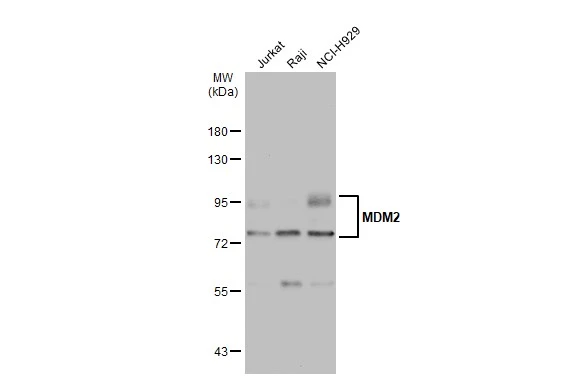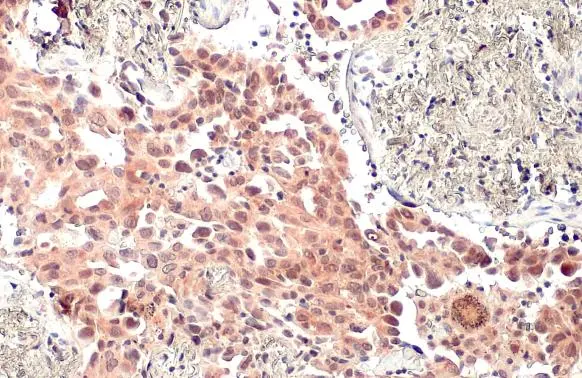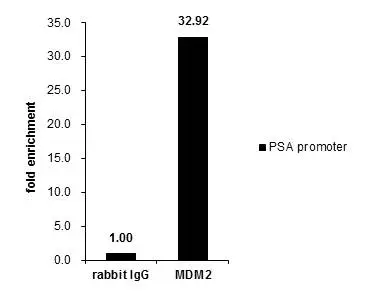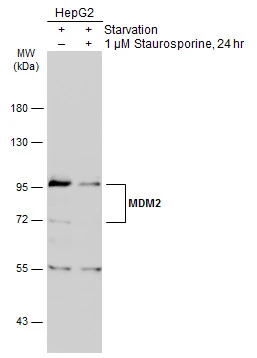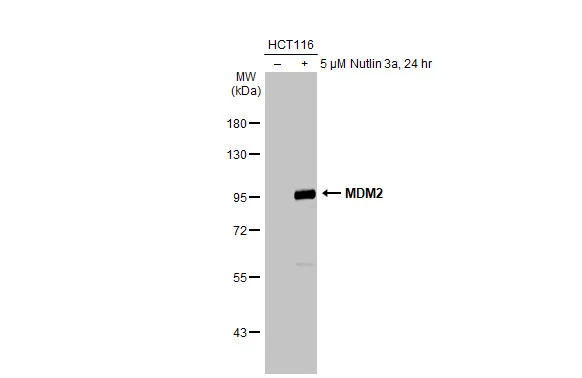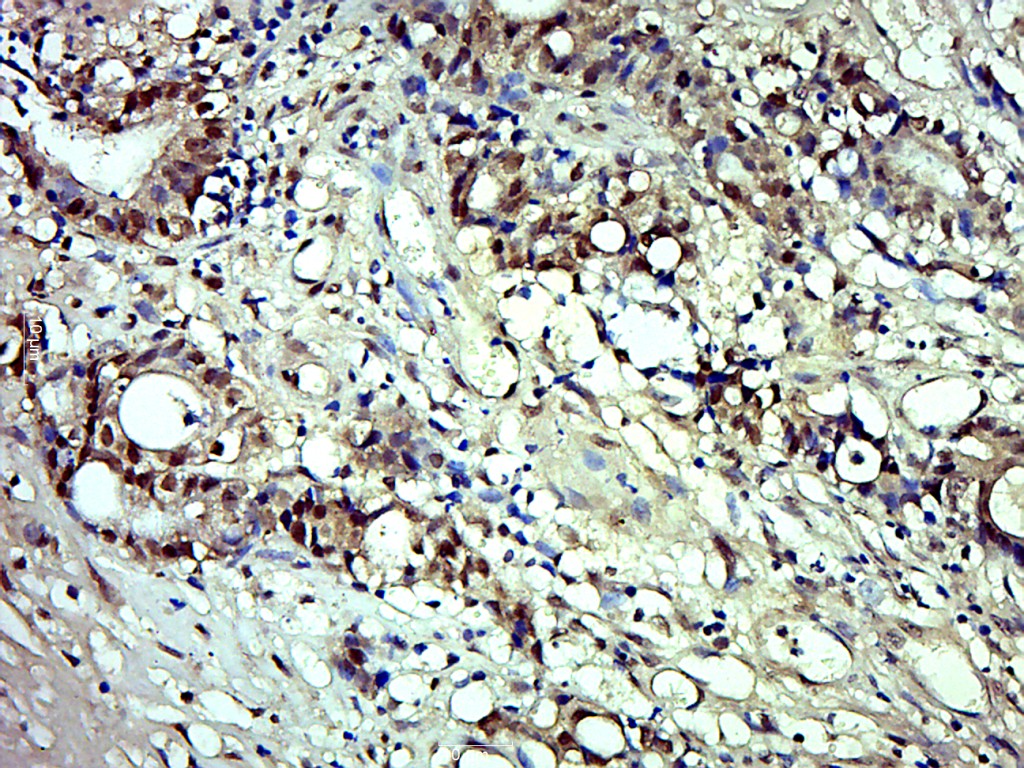![MDM2 antibody detects MDM2 protein at cytoplasm and nucleus by immunofluorescent analysis. Sample: HepG2 cells were fixed in 4% paraformaldehyde at RT for 15 min. Green: MDM2 stained by MDM2 antibody (GTX100531) diluted at 1:500. Red: alpha Tubulin, a cytoskeleton marker, stained by alpha Tubulin antibody [GT114] (GTX628802) diluted at 1:1000. Scale bar= 10μm. MDM2 antibody detects MDM2 protein at cytoplasm and nucleus by immunofluorescent analysis. Sample: HepG2 cells were fixed in 4% paraformaldehyde at RT for 15 min. Green: MDM2 stained by MDM2 antibody (GTX100531) diluted at 1:500. Red: alpha Tubulin, a cytoskeleton marker, stained by alpha Tubulin antibody [GT114] (GTX628802) diluted at 1:1000. Scale bar= 10μm.](https://www.genetex.com/upload/website/prouct_img/normal/GTX100531/GTX100531_44608_20220624_ICC_IF_22062919_841.webp)
MDM2 antibody detects MDM2 protein at cytoplasm and nucleus by immunofluorescent analysis. Sample: HepG2 cells were fixed in 4% paraformaldehyde at RT for 15 min. Green: MDM2 stained by MDM2 antibody (GTX100531) diluted at 1:500. Red: alpha Tubulin, a cytoskeleton marker, stained by alpha Tubulin antibody [GT114] (GTX628802) diluted at 1:1000. Scale bar= 10μm.
MDM2 antibody
GTX100531
ApplicationsImmunoFluorescence, ImmunoPrecipitation, Western Blot, ChIP Chromatin ImmunoPrecipitation, ImmunoCytoChemistry, ImmunoHistoChemistry, ImmunoHistoChemistry Paraffin
Product group Antibodies
ReactivityHuman, Mouse
TargetMDM2
Overview
- SupplierGeneTex
- Product NameMDM2 antibody
- Delivery Days Customer9
- Application Supplier NoteWB: 1:500-1:3000. ICC/IF: 1:100-1:1000. IHC-P: 1:100-1:1000. IP: 1:100-1:500. *Optimal dilutions/concentrations should be determined by the researcher.Not tested in other applications.
- ApplicationsImmunoFluorescence, ImmunoPrecipitation, Western Blot, ChIP Chromatin ImmunoPrecipitation, ImmunoCytoChemistry, ImmunoHistoChemistry, ImmunoHistoChemistry Paraffin
- CertificationResearch Use Only
- ClonalityPolyclonal
- Concentration1.1 mg/ml
- ConjugateUnconjugated
- Gene ID4193
- Target nameMDM2
- Target descriptionMDM2 proto-oncogene
- Target synonymsACTFS, HDMX, LSKB, hdm2, E3 ubiquitin-protein ligase Mdm2, MDM2 oncogene, E3 ubiquitin protein ligase, MDM2 proto-oncogene, E3 ubiquitin protein ligase, Mdm2, p53 E3 ubiquitin protein ligase homolog, Mdm2, transformed 3T3 cell double minute 2, p53 binding protein, double minute 2, human homolog of; p53-binding protein, oncoprotein Mdm2
- HostRabbit
- IsotypeIgG
- Protein IDQ00987
- Protein NameE3 ubiquitin-protein ligase Mdm2
- Scientific DescriptionThis gene is a target gene of the transcription factor tumor protein p53. The encoded protein is a nuclear phosphoprotein that binds and inhibits transactivation by tumor protein p53, as part of an autoregulatory negative feedback loop. Overexpression of this gene can result in excessive inactivation of tumor protein p53, diminishing its tumor suppressor function. This protein has E3 ubiquitin ligase activity, which targets tumor protein p53 for proteasomal degradation. This protein also affects the cell cycle, apoptosis, and tumorigenesis through interactions with other proteins, including retinoblastoma 1 and ribosomal protein L5. More than 40 different alternatively spliced transcript variants have been isolated from both tumor and normal tissues. [provided by RefSeq]
- ReactivityHuman, Mouse
- Storage Instruction-20°C or -80°C,2°C to 8°C
- UNSPSC41116161

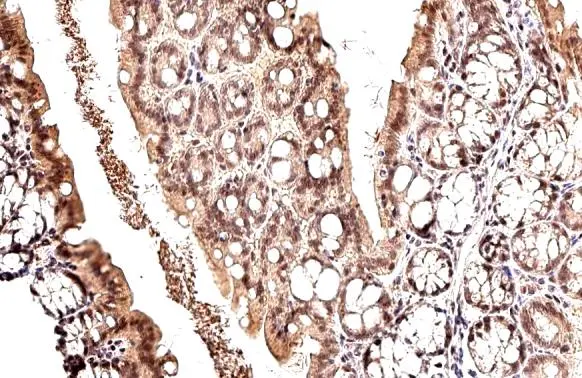
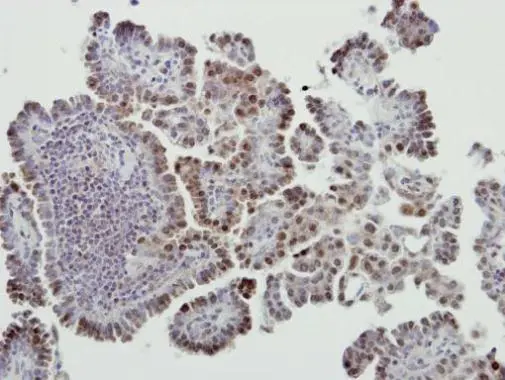
![MDM2 antibody immunoprecipitates MDM2 protein in IP experiments. IP samples: Jurkat whole cell extract A. 30 μg Jurkat cell whole cell extract B. Control with 4 μg of preimmune Rabbit IgG C. Immunoprecipitation of MDM2 protein by 4 μg MDM2 antibody (GTX100531) 7.5 % SDS-PAGE The immunoprecipitated MDM2 protein was detected by MDM2 antibody (GTX100531) diluted at 1:500. [EasyBlot anti-rabbit IgG (GTX221666-01) was used as a secondary reagent] MDM2 antibody immunoprecipitates MDM2 protein in IP experiments. IP samples: Jurkat whole cell extract A. 30 μg Jurkat cell whole cell extract B. Control with 4 μg of preimmune Rabbit IgG C. Immunoprecipitation of MDM2 protein by 4 μg MDM2 antibody (GTX100531) 7.5 % SDS-PAGE The immunoprecipitated MDM2 protein was detected by MDM2 antibody (GTX100531) diluted at 1:500. [EasyBlot anti-rabbit IgG (GTX221666-01) was used as a secondary reagent]](https://www.genetex.com/upload/website/prouct_img/normal/GTX100531/GTX100531_40310_IP_w_23060100_256.webp)
